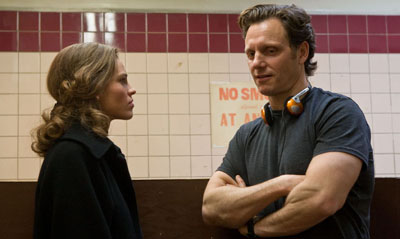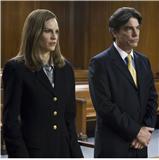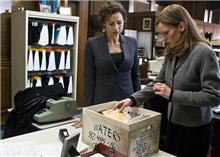|
High school drop-out “Betty Anne Waters” starts to study,
learns she’s really, really smart, & unleashes the tigress within
in the inspiring new film CONVICTION!

Click HERE to read Jan’s review on
WomenArts!
Click HERE to download review as a printable pdf.

|
Jan
Chats
about
CONVICTION
with director
Tony Goldwyn
&
screenwriter
Pamela Gray |
EDITOR’S NOTE: The first time each character is discussed, her name is introduced in quotes to remind FF2 readers that this interview is about “characters” rather than “real people.” Although CONVICTION is clearly based on a true story involving real people, fitting their story into a cinematic narrative required judicious use of dramatic license (several instances of which are described below). As I’ve said in the past, I don’t know any of the people depicted in this story, so I cannot and will not judge them. As a film critic, my job is to describe how art elucidates the human condition. Historical interpretation is not the job of film critics, historical interpretation is the job of historians. |
Jan Chats with Tony Goldwyn
CONVICTION’s Director
Click HERE to download this chat as a printable pdf.
Jan: I can’t pretend to be “neutral” here, Tony. Since I knew I was going to see a new film by the same team who did
A WALK ON THE MOON, I walked into the screening room with very high expectations. So it’s an honor to tell you now, face-to-face, how genuinely moved I was by
CONVICTION.
I think I read a quote from you somewhere to the effect that, in both films, you and [screenwriter] Pamela Gray wanted to look at periods of great social upheaval, so each film is centered on one woman who is working her way through this time of transition. Can you talk about that a bit more?
Tony: I don't remember saying that about
CONVICTION, but I definitely felt that way about
A WALK ON THE MOON, so I'll take credit for it. Both stories are about a woman who has a certain view of herself and through the experience [in the film], she becomes someone else.
For “Betty Anne” in CONVICTION, given the childhood that she had (I didn't want to be melodramatic about it, but, in fact, much more difficult than what we portray), all she wanted was normalcy. Betty Anne was in and out of foster care for several years. A very unstable parental situation, her mother was just not a mothering person.
So what Betty Anne wanted for herself was just simple normalcy: to be a mom and have a normal life. When she sees her baby, baby “Richard” [her first child], Betty Anne says: "I don't want to be like my mother." But she's thrust into this situation when her brother “Kenny” is incarcerated. She just literally can't function with Kenny in jail—feels this compulsion to get him out or to fix it somehow.
And if you talk to [the real] Betty Anne, she says: "I never thought I could do it…" It was probably Kenny's confidence in her that inspired Betty Anne to keep going, but it was just—there was no choice. She just had to keep going, and through that, she discovered this lioness within herself.
Jan:
And she also learned she was a really smart person.
Tony:
I was just going to say: "and a brilliant person." Betty Anne passed the Bar in two states on her first try, like that! (Tony snaps his fingers.)
I show her, for dramatic purposes, struggling through law school, but she didn't really struggle through law school. She struggled to manage it all, but she never had a hard time in school. But I needed to create struggles. That was dramatic license there.
Betty Anne discovered that there was this extraordinary and powerful force inside of her, which, to me, is such a fascinating aspect of life. The strangest circumstances, the most difficult or tragic or undesired circumstances produce unexpected and extraordinary byproducts.
Jan:
I had the great good fortune to interview Barbara Kopple when she came to the Chicago International Film Festival to show her Dixie Chicks doc
SHUT UP & SING a few years back, so I asked her: Is “courage” different in a male context versus a female context? And one of the things she said in reply was that people generally don’t expect women to be courageous.
Tony:
Not only do they not expect women to be courageous, they actively stifle them.
In this story (we don't show too much because I didn't want to lean too hard on it), but “Rick,” Betty Anne husband, he not only doesn't understand what she's doing, he resents it.
I really tried hard not to vilify him, because I feel his point of view is valid. He's just a guy trying to have a normal life, and here's his wife, having this insane obsession.
I think if it were the shoe on the other foot, it would've been a very different story. If the husband was saying: "I’m going to get my brother out..." Now if he wasn't providing for the family, there might be tensions at home, but not in a way that she seems literally insane. So I think that [Barbara Kopple’s comment] is true.
Jan:
Well the balance is really important, Tony. It's not like Rick shuts down all at once. You show him trying to live with Betty Anne’s “insane obsession” for several years.
And you could have painted “Nancy Taylor,” the arresting officer, as a villain too, but instead you give her a very poignant final scene. Your Nancy Taylor has worked really hard to rise above “women’s work,” but you show her pushed back into the “pink ghetto” at the end, making us feel that for her, being in a clerical position means living a life that’s almost worse than death.
Tony:
Nancy Taylor, yeah, we were just piling on Nancy Taylor. We already knew she was “the bad guy,” but, again, I wanted to portray Nancy Taylor as having a reasonable point of view. So she says to Bettye Anne: "I’m sorry you've wasted your life on this, but your brother killed that woman." And it worked just much better dramatically in that way.
Jan:
So Nancy Taylor is all alone at the end, CONVICTION’s “Iago,” the tragic villain, but what sustains Betty Anne is her ability to make connections: her love for her children, her banter with her friend “Abra,” her genuine respect for attorney “Barry Scheck,” and, of course, her devotion to her brother Kenny (and through him, to his daughter “Mandy”).
Tony:
Yeah, that's true; that is what sustains. You know Betty Anne's great survival skill—I realized getting to know her—her great survival skill is her understanding of what it means to love another person. That, to me, is her great heroism and the source of her courage and her strength. Betty Anne, because she just impulsively and instinctively loves the people in her life, she has this network of people that adore her.
The other night we were all in Toronto together, and Betty Anne’s niece Mandy (the real Mandy) said: "I grew up my whole life not having anyone expect anything of me,” (because she grew up with “Brenda” and thinking her father was a murderer). "Suddenly someone expects something of my life." And Mandy is devoted to Betty Anne, and Betty Anne's like a mother to her now. And Abra, you see them together and they're just so deeply connected. It's an inspiring thing to see.
Jan:
And because of your film, Tony, I was able to see it all too
J
© Jan Lisa Huttner (10/28/10)
October 8th f2f conversation
conducted, condensed, & edited by Jan Lisa Huttner.
|

|

|
|
When brother “Kenny” (Sam Rockwell) is arrested for murder, “Betty Anne Waters” (Hillary Swank) must emerge from the background and transform herself into a lawyer, pleading Kenny’s case side-by-side with “Barry Scheck” (Peter Gallagher) founder & director of The Innocence Project.
Photo Credits: Ron Batzdorff |
Jan Chats with Pamela Gray
CONVICTION’s Screenwriter

Oct 15, 2010: Screenwriter Pamela Gray (left)
at the London Premiere of Conviction with Betty Anne Waters.
The character of Betty Anne Waters is played in the film by actress Hillary Swank.
Photo Credit: s67/ZUMA Press/Newscom. All Rights Reserved.
Click HERE to download this chat as a printable pdf.
Jan:
OK, Pamela, you know I’ve already spoken with director Tony Goldwyn f2f, and since then I’ve also read some early reviews of
CONVICTION from the Toronto Film Festival, so I'm just gonna lay it right out: I think sometimes men get so involved in the "what" of something that they don't see the "how."
In CONVICTION, the "what" is obvious: It’s a true story based on one of the Innocence Project cases, so we know going in that DNA evidence will eventually prove that Kenny isn’t guilty, and he will eventually be released. If we know all this going in, then
CONVICTION can’t be about the “what.” So isn’t the dynamic of your film explaining the "how"?
Pamela: Yes, I think that, and I know this will sound like a generalization, but I think what you're describing is the difference between black and white thinking and understanding the shades of gray.
When I sit in these theaters and look around and see men crying, I can't understand how someone cannot be moved by this film. I don't know how you can't be affected by imagining what it would be like to lose half your life in prison when you're innocent. And I don't know how you can see this film and not be affected by this brother/sister bond. And just from the plot level, even if you know the ending, how you get from the beginning to the end, it's remarkable.
Jan:
Well, me, I love the way it was done. This woman, Betty Anne, she went on a 20-year journey, building a remarkable support team along the way—drawing more and more people to her side as she went. That's the story.
Pamela:
That is the story.
Step back and look at it as a character portrait: if you imagine for a minute that Betty Anne Waters wasn't a real person, this is the story of a woman who never ever gives up, to the point where she appears to be in denial about the obstacles.
For me that moment in the story where Betty Anne says: "It's just a setback. The evidence hasn’t been destroyed," this is the moment where you think: “Okay, is she crazy?" And I think that scene really shows that, on the faces of her friends. Every performance in this movie is remarkable.
Jan:
I think so too, Pamela, I really do. For someone like me, someone attentive to female performances for a good ten years or so now (multiplex films, Indie films, etc, etc), the female talent on display in
CONVICTION is extraordinary. Not just in the lead roles—Hillary Swank as Betty Anne, Minnie Driver as Abra Rice, and Melissa Leo as Nancy Taylor—they’re all wonderful, but the actresses in the supporting roles really provide depth too.
Clea DuVall (from THIRTEEN CONVERSATIONS ABOUT ONE
THING) has a relatively minor part as Kenny’s girlfriend “Brenda Marsh,” but she's still terrific. And casting Ari Graynor as their daughter “Mandy Marsh,” what a find! Graynor was cute in NICK AND NORAH’S INFINITE PLAYLIST, and she was touching in HOLY ROLLERS, but in this movie, in
CONVICTION’s final scenes, Graynor’s performance is pure revelation.
Pamela:
I completely agree with you. Every time I watch CONVICTION, I can't take my eyes off here. Like what she can do with her face and her emotional reactions that aren't spoken—it’s a tremendous performance.
Jan:
Yes, it's brilliant. A lot of people will be seeing Graynor for the first time in
CONVICTION, but even for me, even having seen key earlier performances, “Mandy” came out of nowhere for me. I sat in the theatre and
thought: “Oh my God, she's terrific!”
And then, of course, when I looked her up in IMDb, I learned that she’s our schvester too!
Pamela:
I was just going to ask you that. I assumed she was Jewish, but she's the only cast member I never met. I wasn't on the set for her scenes, and she wasn't at the
CONVICTION
premiere.
Jan:
Yeah, her first name in IMDb is “Ariel Geltman Graynor,” so, ya know: Huttner, Gray, schvesters are taking over the world ;-)
But seriously, this great wealth of female talent on screen gives
CONVICTION true depth and resonance, which is a credit to your story and to Tony as director for sure.
Pamela:
Thank you, Jan. Casting, yes, Tony is a genius at it. And as an actor/director who's also an actor, he works so well with actors. They love working with him.
I've seen him in action and I was privileged during this production to be in rehearsal. We didn't really have much rehearsal time for
A WALK ON THE MOON, and just to watch the actors and their process in
CONVICTION… They would ask me questions and whether I had the answers or not, it led to rewriting during production, which was the most exhilarating part of the writing process because you've got the collaborative energy and you're seeing it immediately
come to life. You write something and then the character is standing right there!
So just what a gift to have these performances, these actors, and there was also this universal level of commitment in this production. I would speak to someone in the sound department who would say: "I wanted to be on this movie because the Betty Anne story is so remarkable and heroic."
Jan:
Good segue, Pamela! So, about “the” Betty Anne story, aren’t there really two stories going on in
CONVICTION? One is the story of Betty Anne’s determination to free Kenny, of course. But isn’t there also another story, a story in which Betty Anne comes to a new self-understanding and changes her concept of what's possible for her in her life?
Pamela:
That's right. Jumping to this idea of how Betty Anne will get Kenny out of prison, I love when Hillary Swank (as Betty Anne) delivers that speech to Sam Rockwell (as Kenny) about her plan: it may not work, and she might be 80 years old, but she's going to do it anyway to save him!
I wrote that speech, and I love when Hillary delivers it. As a writer, what I always say about characters is this: when all is lost, you either take action or you give up, and the choice you make is a reflection of who you are as a character. Betty Anne took action at the moment when Kenny was giving up. That’s a sign of how deeply they loved each other so that when Kenny was falling down into despair, Betty Anne made it her life's goal to bring him up and then to bring him out and get him out of prison.
Jan:
Last subject: “Abra Rice.” Abra Rice is Betty Anne’s BFF (played on screen by Minnie Driver).
The night Tony and Betty Anne did their “Word of Mouth” screening here in Chicago, I knew I would be meeting with them the next day, so I decided not to reveal myself in the Q&A. By that point, of course, I knew there was a real person named Abra Rice, but wanted a spontaneous reaction from Betty Anne. So, in the Q&A, I had my husband ask: "Is Abra Rice is a real person?"
Picture Betty Anne, under the lights, being hit with a million questions, and she just looks straight at my husband and she says: "Abra Rice is my best friend." She uses the present tense: “Abra Rice is my best friend."
The bond between Betty Anne and Abra is a critical aspect of
CONVICTION. Your screenplay depicts this relationship, and two wonderful actresses capture it in their performances, but based on the reviews I’ve read so far, I’m not sure some of my esteemed male colleagues see it…
Pamela:
That's right. So I guess one of the things you're addressing is the fact that people aren't paying… a lot of people aren't paying attention to that other primary relationship in the film?
Jan:
Right.
Pamela:
I think they are because they love Minnie’s performance and the chemistry between Abra and Betty Anne, but they may not be able to contextualize that this is another very deep relationship [in Betty Anne’s life]. And perhaps the humor, especially Minnie's humor, might be more accessible than realizing how committed she was to helping Betty Anne.
Jan:
So OK, we know the “real Abra Rice” is a public defender now, right? So what do you think, Pamela? What did these two women see in each other, way back when, that became such a sustaining force in “the Betty Anne story” as you depict it in
CONVICTION?
Pamela:
I think their initial bond was that they recognized each other the first day of law school. They joke in the movie that they were “the old ladies,” but it was also this sense of kindred spirit: they were independent women in this new environment and I think they initially bonded over that.
“The real Abra Rice” is now a public defender in New Haven. When Abra says in the movie, "I became a lawyer to help people who were screwed by the system," she doesn't know that she's talking to someone who is living and breathing the experience of having been screwed by the system.
They became BFFs before that phrase was used. Abra, the real Abra, she teases Betty Anne constantly, and it's hilarious to be around them, but you know that they adore each other.
Jan:
Someone might accuse of you of making all that up, but not me. When I saw
CONVICTION the first time, before I knew anything about any of the facts that lay behind the screenplay, I knew in my gut that the onscreen relationship between Abra and Betty Ann was fundamentally true. It was too real not to be.
Pamela:
When you write a screenplay, you have to fictionalize, you have to dramatize. I didn't have to make up these characters, but I still had to imagine what they said to each other. It's not a documentary. I wasn't there.
But as long as you follow the path of what their emotional connections are, you can get at the truth, and I also had the advantage of meeting the real people. It takes two minutes to understand who Abra Rice is.
Jan:
So you can see in your mind’s eye the scene where Abra has to convince Betty Anne to get
out of bed?
Pamela:
That's right.
Jan:
There are moments when, even with the greatest determination, we all lose heart, but
CONVICTION shows Betty Anne’s network—being a mother, being a sister, being an aunt, being a friend—these relationships pulled Betty Anne through?
Pamela:
Absolutely, absolutely. And I believe that just one difference between movies where the woman is the heroine [versus a male hero]. Often the male hero is the solo person, moving through [the film] without that community. But I do think the heroine's journey is different in that way. I see that in a lot of movies that are female-driven: they've got community; they're not working in isolation.
© Jan Lisa Huttner (10/28/10)
October 8th telephone conversation
conducted, condensed, & edited by Jan Lisa Huttner.

Minnie Driver co-stars as Betty Anne’s law school buddy & BFF
“Abra Rice,” now a public defender in New Haven, CT.
Photo Credits: Ron Batzdorff
|
